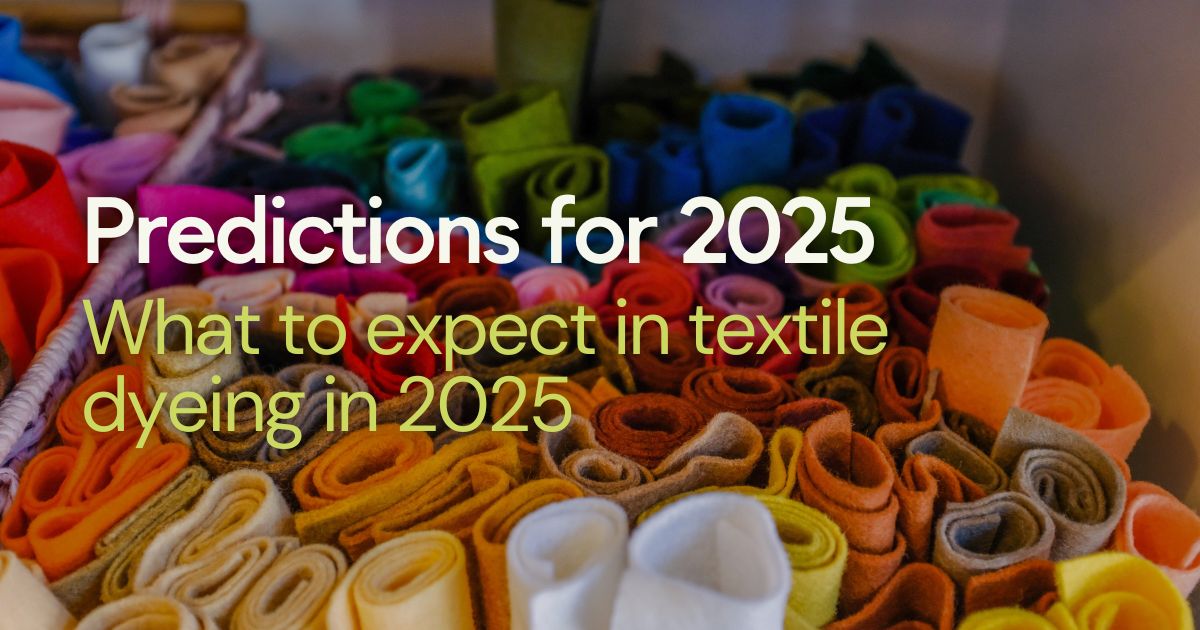
The textile dyeing and finishing industry is poised for transformative changes in 2025, driven by innovations in sustainability, advanced technology, and evolving consumer demands. Brands and manufacturers will face new challenges but also seize unique opportunities to adapt to shifting priorities and values. This article will explore the critical trends likely to shape the industry, offering actionable insights to help brands, manufacturers, and textile professionals navigate the year ahead.
Not only is 2025 an exciting year for textiles, but also for us at Alchemie Technology. We will be launching our new service offering which allows brands and manufacturers to experience our technologies without the financial outlay. Stay up to date on our socials for the latest developments as we encourage you to join us on our journey to make textiles a clean-tech industry.
A New Era for Textiles
The global textile industry has entered an era of rapid evolution. In 2025, we anticipate a significant shift from traditional practices to innovative solutions that address environmental concerns, ethical considerations, and technological advancements. Consumers, particularly younger generations (i.e., Gen Zs), are demanding accountability, quality, and sustainability from brands.
Sustainability will no longer be a mere buzzword in 2025
- Traceable Supply Chains
- Blockchain technology will offer end-to-end visibility, enabling consumers to track a product’s journey from raw materials to the final garment. Brands investing in traceable systems will gain a competitive edge by demonstrating ethical practices.
- Circular Fashion
- The focus on circularity will drive innovations in repairable, recyclable, and biodegradable products, reducing textile waste through advanced fabrics and recycling programs.
- Digital Dyeing and Carbon Capture
- Consumer Behaviour
- According to McKinsey & Company, consumer behaviour in 2025 will reflect a deeper commitment to ethical purchasing. Gen Z, in particular, will lead the charge by prioritising values over volume. This shift is transforming fast fashion, giving rise to "slow fashion" and premium-quality textiles.
Economic Factors and Global Trade
- Trade Policies and Supply Chain Resilience
- Potential shifts in trade policies, such as tariffs or restrictions, could disrupt supply chains. Brands must prioritise resilience by diversifying suppliers and investing in localised production.
- Microfinance and Ethical Sourcing
- Microfinance initiatives will enable smaller producers in developing countries to access premium raw materials and adopt sustainable practices. Supporting these efforts aligns with consumer demand for ethically sourced products and strengthens global supply chains.
- Investment in Fair Trade Practices
- Brands and manufacturers are expected to increase invest in fair trade partnerships. These efforts will resonate with socially conscious consumers.
What Brands and Manufacturers Need to Know
As we enter 2025, brands and manufacturers in the textile dyeing industry must align their strategies with emerging trends to remain competitive. Here are the primary takeaways for you:
- Embrace Sustainability at Every Level
- Brands and manufacturers must implement waterless dyeing, circular design principles, and traceable supply chains to meet consumer expectations and regulatory requirements.
- Leverage Technology for Innovation and Efficiency
- Investing in modern technology and continuously innovating will enhance operational efficiency and open new market opportunities.
- Focus on Quality and Ethical Practices
- Brands must deliver high-quality products while showcasing their commitment to fair trade and sustainability, for example through Digital Product Passports.
Building a Sustainable Future Together
The textile dyeing industry in 2025 will be defined by its ability to adapt to sustainability imperatives, technological advancements, and shifting consumer values. Brands and manufacturers that embrace these changes will not only thrive but also contribute to a more equitable and sustainable future for textiles.
At Alchemie, we are committed to partnering with brands and manufacturers to help you achieve your ESG goals courtesy of our technologies. Through collaboration and innovation, we can build a more sustainable future for the textile industry and beyond.
Learn more how we can collaborate to achieve your ESG goals, contact us at enquiries@alchemietechnology.com.